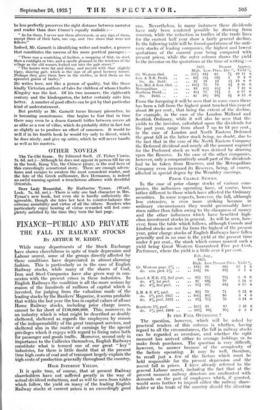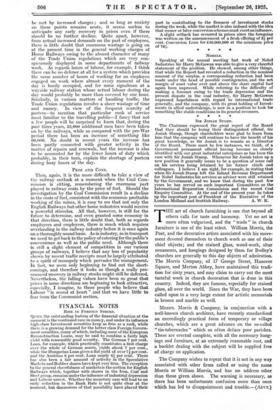FINANCE-PUBLIC AND PRIVATE
THE FALL IN RAILWAY STOCKS
BY ARTHUR W. KIDDY. _ While many departments of the Stock Exchange have shown cheerfulness in spite of trade depression and Labour unrest, some of the groups directly affected by these conditions have depreciated in almost alarming fashion. This is particularly so in the case of English Railway stocks, while many of the shares of Coal, Iron and Steel Companies have also given way in con- nexion with the present crises in these industries. In English Railways the condition is all the more serious by reason of the hundreds of millions of capital which is invested, for judging from the valuation made of the leading stocks by the Bankers' Magazine, it seems probable that within the last year the loss in capital Values of all our Home Railway stocks, including prior charge issues, cannot be far short of £150,000,000. This, moreiiver, in an industry which is what might be described as doubly sheltered, sheltered as .regards the employees, by reason of the indispensability of the great transport services, and sheltered also in the matter of earnings by the special Privileges which it enjoys with regard tei fixing rates both for passenger and goods traffic. Moreover, 'second only in importance to the Collieries themselves, -English:RailwaSrs constitute what is termed one. of; our great • " key ' industries, for there is little dOubt that at the present time high costs of coal and of transport largely eicplain the high costs of production generally throughout the country.
HIGH INTEREST YIELDS.
.. It is quite true, of 'course, that at .present Railway shareholders have not suffered greatly in the way of actual dividend reductions, and as will be seen from tables which follow, the yield on many of the leading English .Railway stocks at current prices is an exceedingly good one. Nevertheless, in many instances these dividends have only been rendered possible by drawing from reserves, while the reduction in traffics of the trade lines for the current half year show a fairly general decline. In the following table will be found quotations of the ordi- nary stocks of leading companies, the highest and lowest quotations of the current year being compared with present prices, while the outer column shows the yield to the investor on the quotations at the time of writing :- 1925. Present Approx. High. Low. Price. Div.% Yield % CIL Western Ord.
Lon. & N.E. Prefd.
Do. do. Defd.
Lon. Mid. & Scot. Ord.
Metropolitan .. .. Southern Prefd... Do. Defd.
From the foregoing it will be seen that in some eases there has been a fall from the highest point touched this year of about 80 per cent., that being the extent of the decline, for example, in the case of the London Midland and Scottish Ordinary, while it will also be seen that the yields to the investor, calculated upon the dividends for the past year, range from about 7 up to 13 per cent., in the case of London and North Eastern Deferred the great fall in the latter stock being, no doubt, due to the fact that in the case of the North Eastern Company the Deferred dividend and nearly all the amount required for the Preferred stock as well was derived by drawing upon the Reserve. In the case of the other companies, however, only a comparatively small'part of the dividends had to be taken from Reserves, and the Metropolitan Company even increased its Reserves, being, of course, affected in special degree by the Wembley earnings.
PRIOR CHARGE STOCKS.
In the case of prior charge stocks of various com- panies, the influences operating have, of course, been rather different to those which have affected the Ordinary securities. In some respects, however, the fall, although less extensive, is even more striking because in ordinary circumstances they would presumably have risen rather than fallen owing to the cheapness of money and the other influences which have benefited high- class investment stocks in general. As will be seen, how- ever, from the table which follows, although Consols and kindred stocks are not far from the highest of the present year, prior charge stocks of English Railways have fallen generally and in no case is the yield at the present time under 5 per cent., the stock which comes nearest such a yield being Great Western Guaranteed Five per Cent. Preference, where the yield is a little over 5 per cent.
Feb.-Aug., 1925.
High. Low.Present Price. Yield % Ct. Western guar. 5% .. .. 1041 98 981 £5 1 6 do. con. pref. 5% .. .. 103/ 94 931 5 7 6 Lond. & N.E. 5% 2nd guar. .. 821 734 731 5 9
0
do. 4% 1st prof. .. .. 82 691 70 5 14
0
do. 4% 2nd pref. .. .. 814 63/ 641 15 L.M. & S. 4% pref. .. .. 824 73 71 5 13 0 do. 5% pref. 1955 .. .. 1014 94/ 95 5 4 6 do. 4% pref. 1923 .. .. 814 71/ 70 5 14 0 Southern 5% pref. .. .. 1024 91 93 5 10 6 do. 5% pref. 1964 .. .. 1011 944 954 5 5 0
IS THE FALL OVERDONE
The question, however, which will be asked by practical readers of this column is whether, having regard to all the circumstances, the fall in railway stocks can be regarded as overdone, and whether the right moment has arrived either to average holdings or. to make fresh purchases. The question is very difficult, however, to answer because of the complexity of the factors operating. It may be well, therefore, to recall just a few of the factors which must be held responsible for the present depression and the recent fall in prices. I have already referred to the general Labour unrest, including the fact that at the present moment railway directors are confronted with demands on the part of employees .which, if granted, would seem further to imperil either the railway share- holder or the trade of the country should the situatioL' 1111 841 84 71 £8 11 0 831 534 531 5 9 4 0 32 19 19 21 13 0 0 1024 73 73
64
8 16 6 83 65/ 651 5 7 10 6 851 72 724 5 6 17 6 45 38/ 39/ 31 8 15 0 be met by increased charges ; and so long as anxiety on these points remains acute, it seems useless to anticipate any early recovery in prices even if there should be no further decline. Quite apart, however, from actual increased demands on the part of employees, there is little doubt that enormous wastage is going on at the present time in the general working charges of Home Railways owing to the absurd character of many of the Trade Union regulations which are very con- spicuously displayed in some departments of railway work. As regards hours of labour, for example, I think there can be no defence at all for a system which provides the same number of hours of working for an employee engaged on work where almost every moment of the day is busily occupied, and for some signalman at a wayside railway station whose actual labour during the day would probably be more than covered by one hour. Similarly, in various matters of handling traffic, the Trade Union regulations involve a sheer wastage of time and money. In view of the frequent scarcity of porters—to mention that particular rank of service most familiar to the travelling public—I fancy that not a few people will be surprised to learn that, during the past three years, 25,000 additional men have been taken on by the railways, while as compared with the pre-War period there has been an increase of something like 60,000. No doubt in recent years the increase has been partly connected with greater activity in the matter of repairs and renewals, but the increase is also to be accounted for by the fewer hours of duty which probably, in their turn, explain the shortage of porters during busy hours of the day.
PROS AND CONS.
Then, again, it is the more difficult to take a view of the railway outlook at a moment when the Coal Com- mission is sitting, remembering the enormous part played in railway costs by the price of fuel. Should the investigation by the Coal Commission result in a decline in the costs of fuel, consistent with the economic profitable working of the mines, it is easy to see that not only the English Railways but other home industries would receive a powerful stimulus. All that, however, is still for the - future to determine, and even granted some economy in that direction, there is little doubt that, both as regards employees and employers, there is much which requires overhauling in the railway industry before it is once again -ion a thoroughly sound basis. As in industry, so in transport we need to get back to the policy of catering for the public's -convenience as well as the public need. Although there -is still a slight element of competition in our various groups of railways, I believe that any loss of popularity shown by recent traffic receipts must be largely attributed to a spirit of monopoly which pervades the management. In fact, we seem only beginning to find out the short- comings, and, therefore it looks as though a really pro- nounced recovery in railway stocks might still be deferred. 'Nevertheless, the falling values have been so great that prices in some directions are beginning to look attractive, especially, I imagine, to those people who believe that Labour " is sound at heart " and that we have little to fear from the Communist section.



















































 Previous page
Previous page